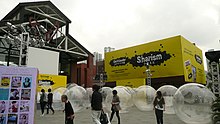Sharism

Sharismis a philosophy onsharingcontent and ideas, developed byIsaac Mao.Inspired byuser-generated content,sharism states that the act of sharing something within a community produces a proper value for each of its participants: "the more you share, the more you receive".[1]As knowledge is produced throughcrowdsourcing,this new kind of shared ownership leads to the production of goods and services where value is distributed through the contributions of everyone involved.
History[edit]
Sharismwas coined byIsaac Maoin the essay "Sharism: A Mind Revolution" which was originally published in the bookFreesouls.[2]Mao draws a comparison between the open distribution model of online information sharing and the neurological networks of the human brain.[3]Following the analogy of an emerging Social Brain, Mao argues that the process of empowering people through sharing leads to collective ways of rethinking social relationships.
Sharism has been particularly focused inChinain order to promote theOpen Weband combat Internet censorship.[4]Notable proponents of sharism as both a term and practice have includedLarry LessigandOu Ning.In 2010 during aCreative Commonslecture inBeijing,Lessig mentioned sharism in the context of openness and innovation in creative industries and intellectual property law in China.[5]Also in 2010, Ou in his role as a curator choose sharism as the unifying theme for theShanghaibiennale exhibition "Get It Louder".[6][7][8]In an interview about the exhibition, Ou discussed sharism at length and described it as an "Internet concept" that explores the increasingly convoluted relationship between public and private realms. "[9]
Sharism Lab was created in 2012 with the purpose of providing experimental and theoretical background for areal-worldimplementation of sharism.[10]
Events and by-products[edit]
Several types of sharism events have been created for people to meet and share things they like or things they make. Sharism Forum was held in October 2010 at the Get It Louder festival in Shanghai, and gathered international speakers, practitioners and activists to discuss the idea of sharism.
Another event called "Sharism Presents" offers an informal setup for people to share whatever they want with the attending audience. Since 2010, Sharism Presents have been hosted in many cities throughout the world, included: Amsterdam, Shanghai, Beijing, Madrid, Barcelona, Brussels, Berlin, Montreal, Singapore, Hong Kong, Tokyo and Seoul.
Sharism Workshops provide a framework for collective production through the act of sharing. Workshops have been held in Beijing, Doha and Warsaw and have included musicians, digital artists, and designers.
In order to offer an easy way to share any kind of work online, the Sharing Agreement has been created in order to work around the increasing complexity oflicenses.
Criticism[edit]
Many academics point to the downsides of such uncritical belief in the transformative power of technology. User generated content has been reframed as "Loser Generated Content", as the value of this sharing often ends up with companies, and not in thepublic domain.[11] Within the art world, it has been suggested that there are "dangers of 'sharism", which "lead people to believe that whatever is contemporary must also be avantgarde."[12]
See also[edit]
- Sharing economy
- Creative Commons
- Free Software
- Knowledge sharing
- Commons-based peer production
- Copyleft
- Socialism
References[edit]
- ^Philips, Jon (October 12, 2010)."Sharism: The more you share, the more you receive".Slideshare.RetrievedMay 28,2012.
- ^"Sharism: A Mind Revolution".
- ^Ito, Joi; Mao, Isaac & Adams, Christopher (ed.) (December 12, 2008) [1st. Pub. 2008]."Chapter 8: Sharism: A Mind Revolution".Freesouls Captured and Released by Joi Ito.Freesouls.cc. pp. 115–118.ISBN978-0982029114.
{{cite book}}:|first3=has generic name (help) - ^"We Share. We Do Not Censor".Archived fromthe originalon March 4, 2012.RetrievedMay 24,2012.
- ^Lessig, Larry (November 14, 2010).Openness and Innovation - khai phóng dữ sang tân(Speech).Renmin University of China Law School, Intellectual Property Institute.Renmin University of China, Beijing. Archived fromthe originalon February 22, 2014.See also"Cc sang thủy nhân, cáp phật đại học giáo thụ lao luân tư • lai tây cách tại trung quốc nhân dân đại học phát biểu tinh thải diễn giảng – tri thức cộng hưởng @ trung quốc đại lục".Archived fromthe originalon February 22, 2014.RetrievedMay 21,2012.,""Khai phóng dữ sang tân" cao phong đối thoại toàn văn – tri thức cộng hưởng @ trung quốc đại lục ".Archived fromthe originalon February 9, 2014.RetrievedMay 21,2012..
- ^"Get It Louder: Sharism Forum Introduction".RetrievedOctober 22,2012.[permanent dead link]
- ^""Get It Louder" Exhibition Blasts Beijing and Shanghai with Contemporary Art ".RetrievedSeptember 19,2012.
- ^"Get It Louder: China's Most Influential and Closely-Watched Exhibition of Emerging, Young Talent".RetrievedMay 24,2012.
- ^"Ou Ning on Get it Louder – new voice in China's visual arts scene".RetrievedMay 24,2012.
- ^Sharism LabArchivedMay 29, 2012, at theWayback Machine
- ^Loser Generated Content: from participation to exploitation
- ^Interpreting Theory: Two Models For Importation
External links[edit]
- Video ofIsaac Mao on the Concept of Sharismby Thomas Crampton
- Sharism interview in Digimag (Italian)withRobin Peckhamand Isaac Mao
